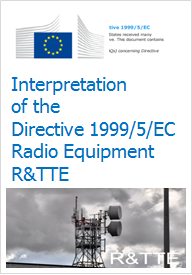Interpretation of the Directive 1999/5/EC
The European Commission and the Member States received many questions on the interpretation of the Directive.
This document contains detailed answers on the following questions. See also the Frequently Asked Questions (FAQs) concerning Directive 1999/5/EC. 1. Ambiguity in Annex III to the Directive
2. Application of Article 6.4 to receivers and discussion on the scope of equipment to be notified
3. Clarification of the relation of the R&TTE Directive with the EMC and LVD Directives
4. Interpretation of Article 6.3 for equipment whose use is harmonised
5. Can an equipment identifier be empty?
6. Application of Article 9.5 of the Directive to receive-only equipment
7. Aspects on which a notified body could give an opinion
8. Possibility for Member States to introduce requirements to enable interception of calls
9. Possibility to place products on the market in the Community, which cannot be used in the Community
10. Transitional provisions
11. Interface publication for innovative services, possibility for Member States to position an NTP at the user side of the terminal
12. What limitations, posed by the WTO and the Treaty limit Member States in regulating interfaces?
13. What notified body number is to be affixed if more than one notified body is involved (Annex IV, or a different notified body is involved for Annex III and Annex IV)?
14. Manufacturers, representatives or persons responsible for placing on the market
15. Should manufacturers notify radio equipment to Member States where equipment can be used or where it is marketed?
16. Is the person signing a declaration of conformity personally liable?
17. Do operators, already offering services have to publish their interfaces?
18. Is there an obligation to disclose radio interfaces in national bands whose use is for equipment not in the R&TTE domain (defence, state security...)? 19. Does Article 12.4 of the Directive oblige manufacturers to include their name as part of the marking?
20. Procedure to use for the notification of interface regulations
21. Are antennas covered by the Directive?
22. Coverage of blinking antennas by the R&TTE Directive
23. Form of the manufacturers' declaration to be put into the users manual
24. Obligations of operators to include information relating to essential requirements
25. Requirements that products which are only sold over the Internet need to meet
26. Relation of Article 1.5 of the Directive with Article 30 of the Treaty and obligations of Member States to notify exemptions under Decision 3052/95 27. Can Member States regulate the technology of network infrastructural equipment and introduce or maintain a type approval system?
28. What kinds of aeronautical equipment does the Directive cover?
29. Are Radars covered by the Directive?
30. When do Commission Decisions have to be applied?
31. What is the relation of the R&TTE Directive with medical devices Directives?
32. Can equipment, which is covered by the Marine Directive (96/98/EC), be installed on non-SOLAS ships or should such equipment in addition be assessed to the R&TTE Directive?
33. Should a notified body number be on the packaging?
34. A question has arisen, whether manufacturers, using these procedures should in their declarations of conformity claim compliance with the R&TTE Directive or whether they alternatively could declare compliance to the LVD and EMC Directives for electrical safety resp. EMC aspects.
35. Installations, conformity assessment and marking of installations
36. Passive RFID tags at the stage of placing on the market and the R&TTE Directive
37. Jammers
Equipment classes
Equipment classes are defined by Article 4.1 of the Directive. The European Commission has adopted a Decision laying down an initial classification - called Commission Decision 2000/299/EC of 6 April 2000. The decision identifies two classes:
Class 1 equipment is equipment that can be placed on the market and be put into service without restrictions as indicated in Article 1(1) of the Decision.
The Commission, in consultation with Member States, publishes an indicative and non-exhaustive list of equipment falling within the scope of Class 1.
Class 2 equipment is equipment for which Member States apply restrictions as indicated in Article 1(2) of the Decision, which also assigns the Alert Sign as Equipment Class Identifier for this class. The following subclasses of Class 2 correspond to radio equipment using harmonised frequency bands for which, in consequence, notification in accordance with Article 6(4) of the Directive is not necessary




















